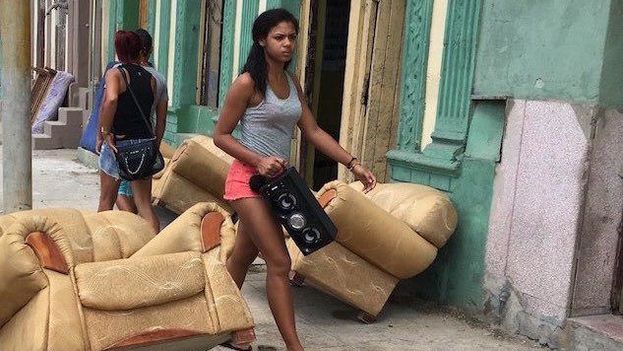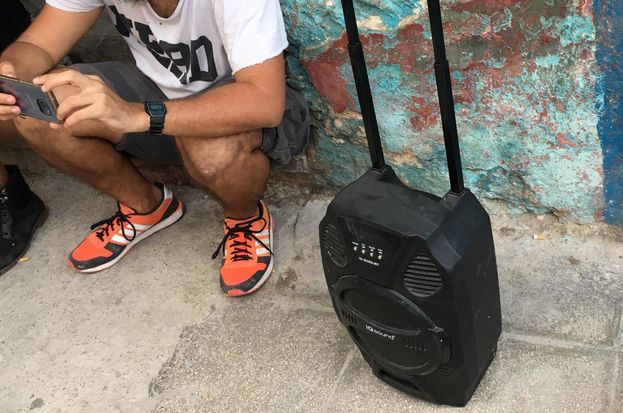
![]() 14ymedio, Zunilda Mata, Havana, 18 December 2017 — Hanging from the young woman’s bag, the small speaker radiates a trap song throughout the bus, making the trip between La Víbora and Vedado into a fun disco or an acoustic martyrdom. In Cuba, where the penal code is so strict, the lax treatment that the authorities maintain toward environmental sound pollution is surprising.
14ymedio, Zunilda Mata, Havana, 18 December 2017 — Hanging from the young woman’s bag, the small speaker radiates a trap song throughout the bus, making the trip between La Víbora and Vedado into a fun disco or an acoustic martyrdom. In Cuba, where the penal code is so strict, the lax treatment that the authorities maintain toward environmental sound pollution is surprising.
The war of the decibels has been unleashed. For decades, a status symbol has been to have powerful music equipment and devices that can play sounds with more watts. That guataje (as it is popularly called) fight becomes a real hell of a life in countless buildings, neighborhoods and public spaces.
The World Health Organization (WHO) says that the human ear can tolerate 55 decibels without damage to health. However, depending on the duration of exposure, noises greater than 60 decibels can cause physical discomfort, such as headaches, tachycardia, agitation in breathing and tension in the muscles.
In Cuba, the limits of what is allowed in terms of noise are generally not clearly defined. Although there is a proper standard on noise and the permitted levels in urban and rural areas, diverse specialists have denounced the “laxity” with which the issue is treated on the island.
The absence of a clear and inclusive law that covers the problem, as well as the lack of essential instruments to measure environmental pollution, make it difficult to confront the problem. Also, Cuba does not have a large number of people qualified to take noise measurements and so noise is addressed in a general way without establishing a relationship with mandatory regulatory standards.
The streets of the Cuban capital and of many provincial cities seem like a real orchestra of different sounds that range from shouting, parties at full volume without prior authorization from the police, and vehicles that circulate in the streets as if they were mobile clubs, blasting music out the windows.
Cuban law has lagged behind the times due to the growth of new technologies. The arrival in the country of wireless connection devices, powered by their own batteries and that broadcast of music, poses a serious challenge to laws that regulate the permissible levels of sounds and noise that date back to 1999.
The Environmental Law of 1997 prohibits, in its article 147, “producing sounds, noise smells and vibrations” that affect human health or damage “the quality of life of the population.”
“The technologies have advanced but the laws are still the same and that is generating a clear contradiction between the noise that an individual can make with one of those speakers and the penalty he receives, a fine of only 200 to 2,250 Cuban pesos,” Osmani Castellanos, a retired jurist, comments to 14ymedio.

Noise pollution violations are not subject to penal sanctions and the authorities consider noise to be of “little social danger,” a classification with which Castellanos disagrees. “When that law was established, we did not know all the negative health effects of noise, which is why it was taken as a social behavior rather than a physical aggression.”
Processing a complaint against a neighbor or state entity for generating noise can be a real ordeal for the victims of the cacophony.
“Between the terrible service and the noise this is intolerable,” a mother complained this Saturday, in a cafe near the National Aquarium west of Havana. The family, with two small children, decided to refresh themselves in one of the state’s food service businesses but ran into a “musical offering” that “doesn’t even let us hear each other talk,” laments the mother.
After several complaints, the employees lowered the volume a little of the reggaeton blasting from the café’s speakers, but even so it was almost impossible to converse at the tables located closer to the speakers. The children played in the middle of the revelry using their hands as megaphones to project their voices more strongly.
In the midst of such shrillness, the street vendors have also chosen to increase the decibels of their cries. It is increasingly common in the cities of the entire island for these merchants to have recorded the phrases with which they seek to attract more buyers.
“Ice cream bars!” is the proclamation that blares, again and again, from a small horn attached to Ricardo’s tricycle, as the ice cream seller travels the streets of Havana’s Cerro neighborhood. “I got tired of screaming and I looked for this, which is better and more professional,” he tells this newspaper.
The litany from Ricardo’s speaker sneaks through the doors and windows, awakens those who sleep, makes children demand that their parents buy them something cold to tickle their tongues and even generates the occasional shouted answers: “Turn that off!” yells an old woman from the balcony, glaring.
“In this country where so many things are forbidden, it’s a miracle that they let this invasion happen,” says the woman, her eyes still half closed from the nap that has been interrupted.
_________________
The 14ymedio team is committed to serious journalism that reflects the reality of deep Cuba. Thank you for joining us on this long road. We invite you to continue supporting us, but this time by becoming a member of 14ymedio. Together we can continue to transform journalism in Cuba.
